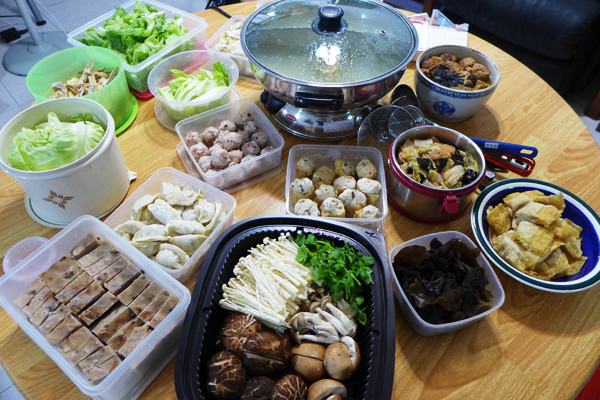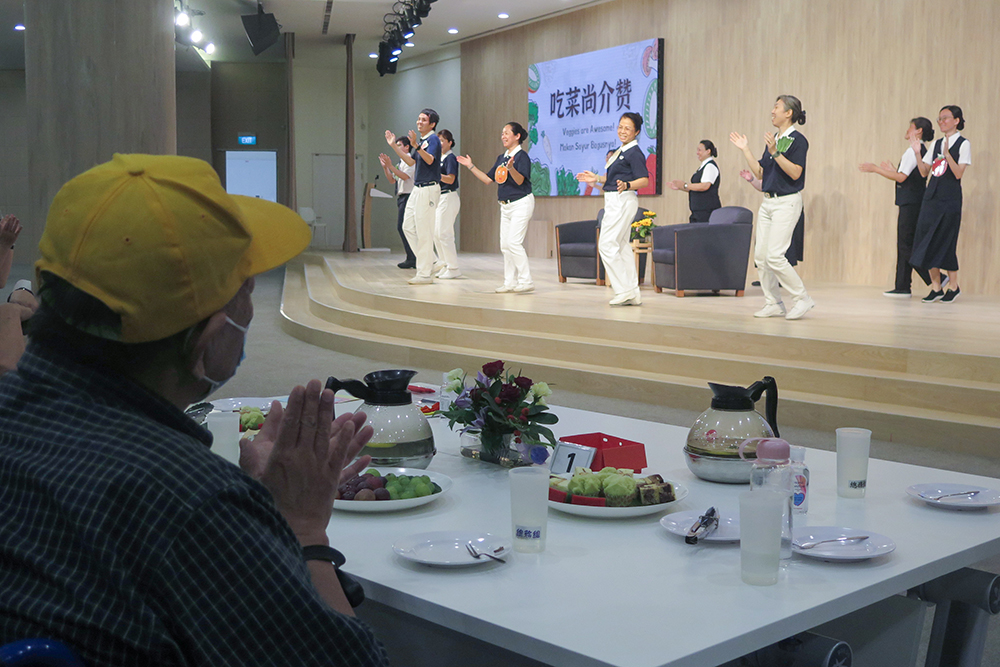
Tzu Chi volunteers sing a Hokkien song titled “It’s better to eat vegetables” and entertain the audience with their funny gestures. Despite performing a song in a Chinese dialect, many of the Malay and Indian participants are seen clapping to the rhythm. (Photo by Chew Zheng Yang)
On 30 October 2022, 52 end-stage chronic kidney disease (CKD) patients and their family members gathered at Tzu Chi Humanistic Youth Centre to attend the first post-COVID-19 Renal Friends Tea Gathering organised by Tzu-Chi Foundation (Singapore).
From the joyful expressions on their faces, it was obvious that many of the CKD patients, who are also Tzu Chi aid beneficiaries, had come for the tea gathering filled with anticipation. Ms Sin Mei Leng, a dialysis patient who came in a wheelchair with her husband, was one of them.
She said with a smile underneath her mask: "Of course I am thrilled to be here today! Besides going out for haemodialysis, my husband rarely takes me out because of the problem with his legs."
66-year-old Ms Sin has been on dialysis for three years. Like many CKD patients who were “sentenced” by doctors to undergo dialysis, she found it difficult to accept it at first and fell into depression. She felt that life was meaningless after starting dialysis.
Fortunately, the encouragement and companionship from her husband managed to change her mind over time.
She said: "There are always ups and downs in life. When you change your perception, you will realise that happiness is your choice. When you don’t treat dialysis as a big issue, everything will be fine."
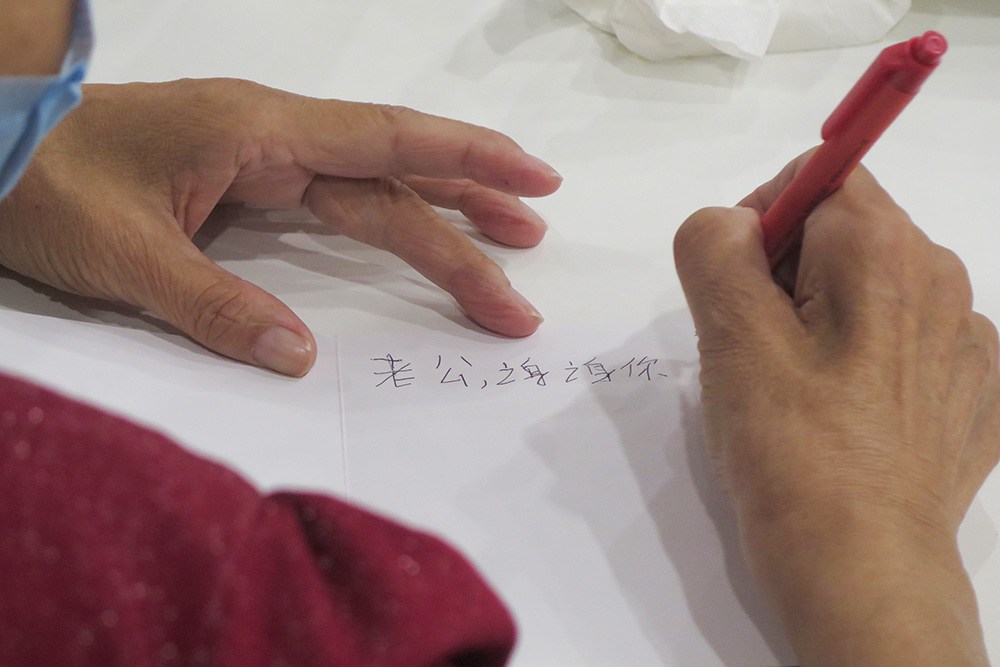 Ms Sin Mei Leng, who is not highly educated, writes "Thank you, hubby" on a piece of paper, followed by a few simple words to her husband. He has been encouraging and accompanying her for 42 years. (Photo by Chew Zheng Yang)
Ms Sin Mei Leng, who is not highly educated, writes "Thank you, hubby" on a piece of paper, followed by a few simple words to her husband. He has been encouraging and accompanying her for 42 years. (Photo by Chew Zheng Yang)
There is still hope for the future
Everyone knows what it is like to fall sick, but not everyone understands the suffering of having chronic renal disease and the pain of undergoing dialysis. From being diagnosed with end-stage kidney failure to having to decide whether to undergo dialysis and live with such a condition, CKD patients can no longer lead a carefree life as they have to endure the torment of the disease and the trouble of frequent visits to a dialysis centre.
The CKD beneficiaries who came for the event did not know each other. However, they still shared their life stories openly with their peers who experienced similar life changes, hoping to support and encourage each other.
59-year-old Mr Syed Hussain (not his real name) raised his hand to share his story. Mr Syed was diagnosed with kidney failure at the end of last year and was admitted to the hospital for emergency dialysis.
He shared: "When I was rescued, I was on a hospital bed with my eyes slightly open. And then I saw white figures in front of me. Everyone was wearing white. I thought I had arrived in heaven."
"The moment I could speak, I asked, 'Is this heaven?'"
Mr Syed’s humour sent the participants on the floor laughing loudly.
"I wish to emit positive energy, so I share my experience."
70-year-old Mr Huang Weiguo, who was seated in the front row also raised his hand and said with tears in his eyes: "I didn't want to live anymore, and I didn't have any hope for the future."
It turned out that Mr Huang was rendered wheelchair-bound after a stroke. And things got worse when he was later diagnosed with kidney failure and required dialysis.
Wiping away his tears, he said: "Fortunately, I have my goddaughter and family to take care of me, and the Tzu Chi volunteers are so kind to me. The spiritual encouragement and support they gave me have made life more meaningful for me to live on."
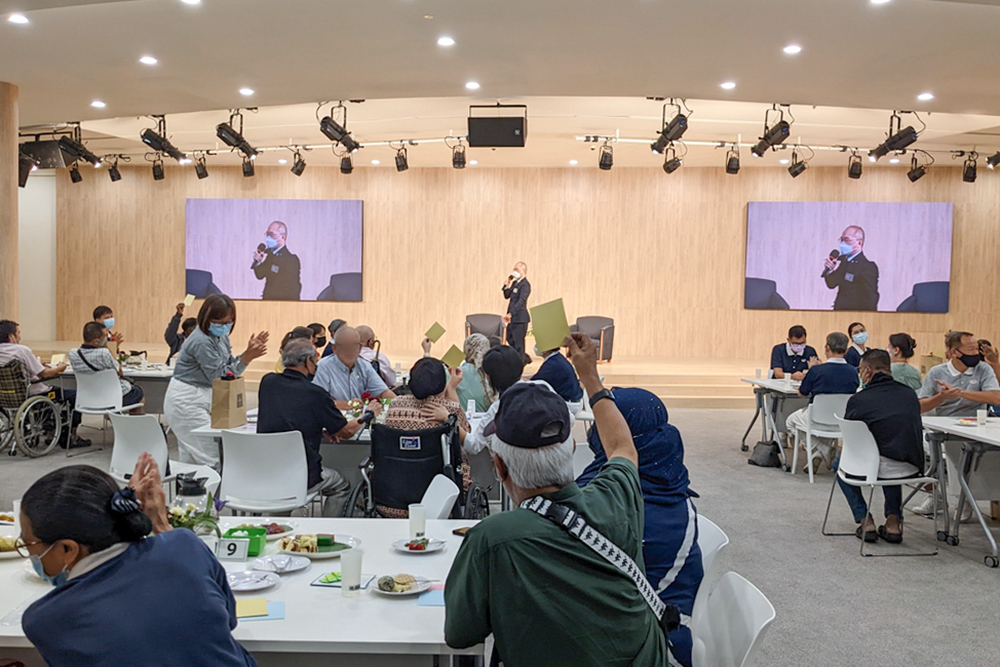
52 CKD beneficiaries and their families are happily gathered for a joyful and relaxing afternoon at the tea gathering. (Photo by Goh Leay Ying)
Many think that people who suffer from renal diseases will only get worse and their condition is irreversible. However, it was not true for Ms Azalina, a dialysis patient of four years, who was invited to speak on stage to bring encouragement and comfort to CKD patients.
She shared: "When I was diagnosed with renal disease, I was so weak that I had to sit in a wheelchair for the first eight months. But my husband did not give up on me; instead, he encouraged me. Now I have regained my ability to walk. I can go to the market by myself and also do my cooking."
Despite not being as healthy as before, Ms Azalina exudes the optimism of a person who has experienced the suffering brought by the illness. She encouraged other CKD beneficiaries to regain their confidence and hope.
"Don't be afraid of dialysis. Be brave and have confidence in yourself," she advised.
The words "never give up" were also repeated firmly five times during her sharing.
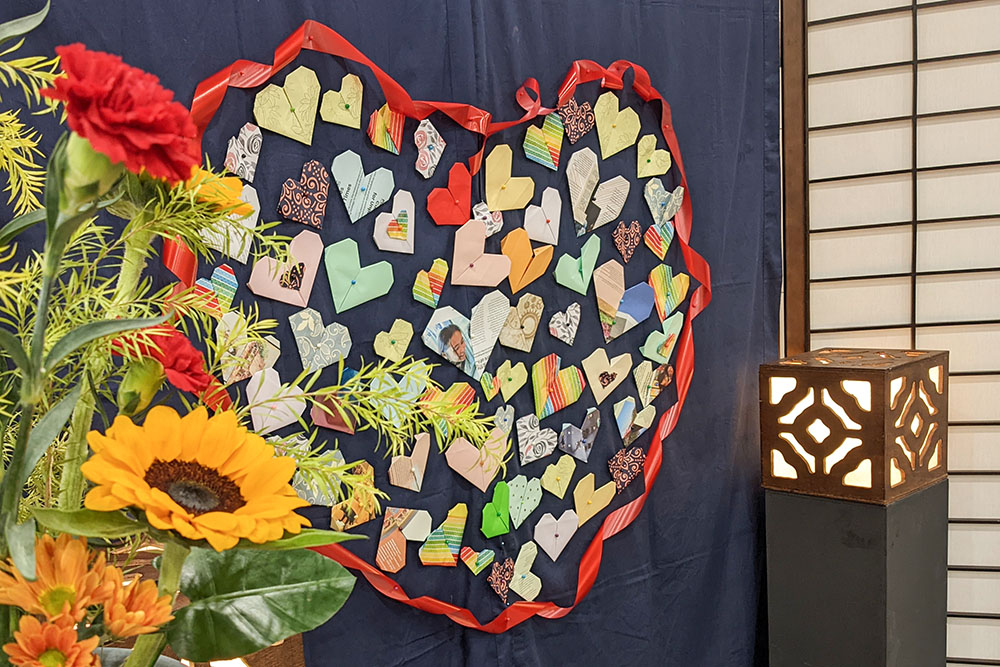 The colourful “Wall of Love" decorated by the event team was a popular photo-taking corner for many of the CKD beneficiaries. (Photo by Alex Chen)
The colourful “Wall of Love" decorated by the event team was a popular photo-taking corner for many of the CKD beneficiaries. (Photo by Alex Chen)
With proper preparations, one can still enjoy a good trip overseas
CKD patients are most concerned about their daily life and health. The organiser invited Dr Yeon Wen Xiang, a nephrologist at Sengkang General Hospital, and Tan Chew Sia, a nutritionist at Khoo Teck Puat Hospital, to advise on the unique issues faced by each CKD patient.
Dr Yeon dispelled five common myths of renal diseases through his seminar titled "Debunking the Myth of Haemodialysis: Living a Healthy and Meaningful Life". Among the myths he clarified included:
"Needle insertion for dialysis is very painful, what should I do?"
"Can renal patients still work?"
"Is it true that patients will feel weakness in their four limbs after dialysis?"
“Is it true that kidney patients can no longer travel overseas freely?”
“Is life meaningless when one has to undergo dialysis?”
CKD patients who have to undergo dialysis for the long term are often troubled by the inconvenience of travelling overseas. A family member of a CKD beneficiary raised his hand and asked: "My daughter-in-law has to undergo dialysis three times a week. Can she still travel abroad or return to the Philippines?"
Dr. Yeon replied that as long as the preparation work is done properly, CKD patients can still go abroad happily and not be trapped by their illness. He also said: "Three days of dialysis, with two days of rest in between, you can go to Malaysia. But if you have to stay in another country for a longer time, you can find out the availability of local dialysis centres before travelling."
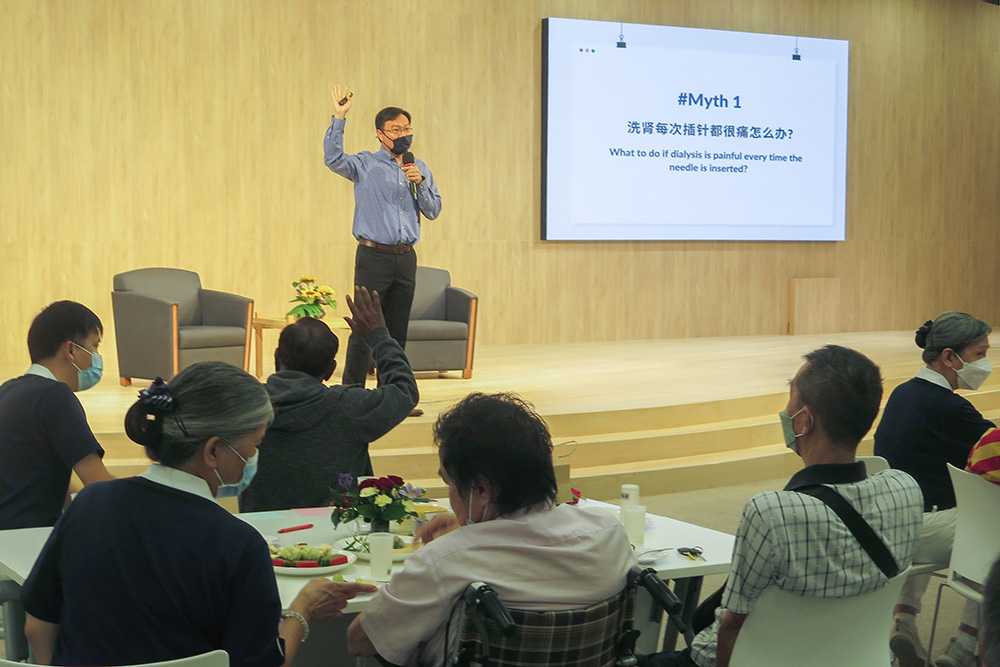 Dr Yeon, a nephrologist at Sengkang General Hospital, answers all the questions from CKD beneficiaries and their family members. (Photo by Chew Zheng Yang)
Dr Yeon, a nephrologist at Sengkang General Hospital, answers all the questions from CKD beneficiaries and their family members. (Photo by Chew Zheng Yang)
Having a balanced diet is something that CKD patients pay close attention to. Dietitian Tan Chew Sia of Khoo Teck Puat Hospital walked back and forth between the participants to share about nutritional management. She shared that CKD patients are aware of avoiding high-potassium food but many vegetables are high in potassium. Most patients do not know which vegetables are high in potassium, so they just eat lesser vegetables and more meat.
However, that might not be the right way to eat. Ms Tan said: “Eating vegetables and fruits is beneficial to our health as they are highly nutritious. Eating more of them reduces our risk of death, improves our cardiovascular health and also prevents constipation and uremia."
"Dark green and leafy vegetables are generally higher in potassium content, but this does not mean that there are no more vegetables suitable for consumption. Renal patients can choose non-leafy vegetables, such as long beans, bean sprouts, cabbage, and eggplant."
Alternating between the three languages of English, Malay and Mandarin during her sharing, there was certainly no language barrier.
Tzu-Chi Foundation (Singapore) started rendering renal support to needy CKD patients in 2005. As of August this year, more than 3,600 CKD patients have benefited from the Foundation’s renal support programmes. As it is a lengthy and difficult journey living with such an illness, Tzu Chi hopes to provide a safe environment and platform for CKD patients to share their life stories and learn with a group of fellows who have experienced similar life changes through the Renal Fellowship Tea Gathering. By sharing medical and health knowledge, and giving mutual support and encouragement for each other, the path of living with renal disease is no longer a lonely one.



